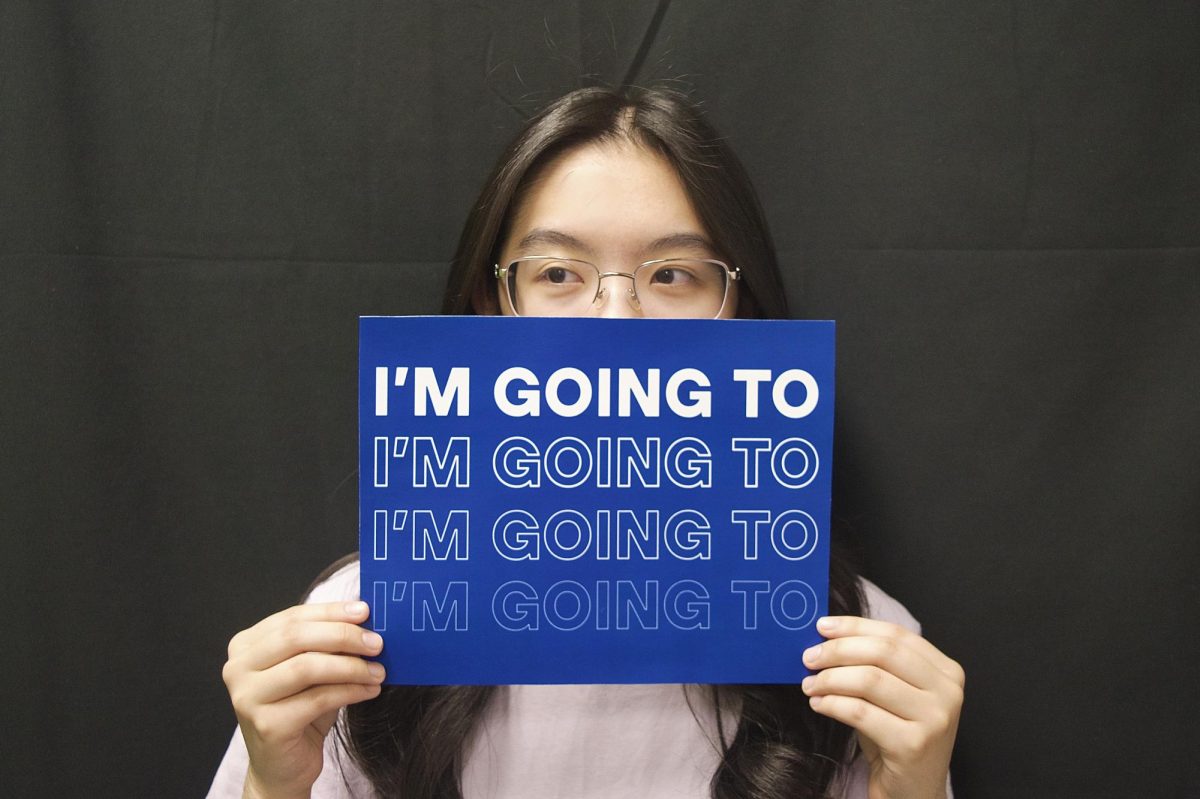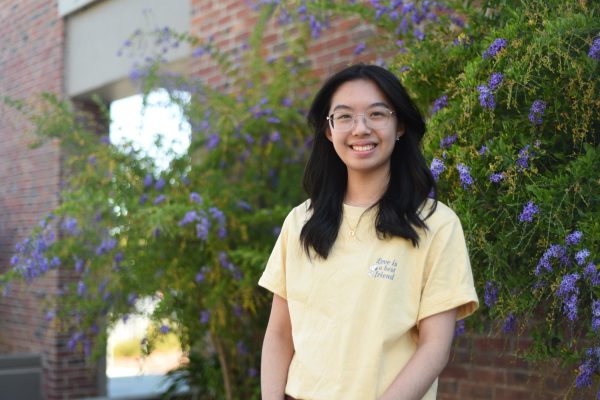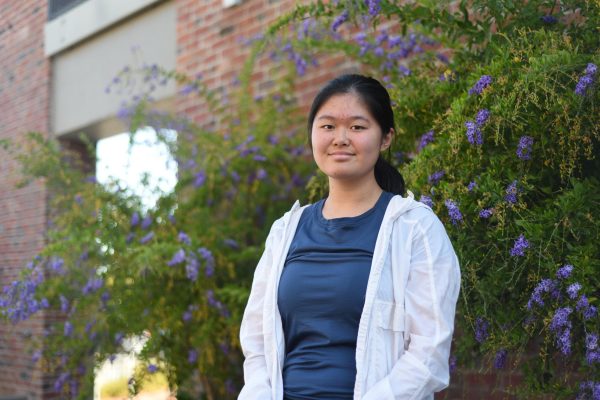For many high school seniors at MVHS, the moment they’ve anticipated and prepared for their last four years arrives in the form of an email notification — it’s the building suspense as they silently deliberate, their finger hovering over the bolded email before the portal opens! And there it is: a college decision that could shape their future. Some of them gasp in joy, some quietly process a rejection and others freeze in disbelief or uncertainty. After the initial shock fades, there’s a question that lingers: “Should I tell anyone? Who can I tell?”
At MVHS, where academic competition is a prevalent contributor to a student’s stress, the college admissions season seems to add a further sense of competition around decisions and acceptances. Some students might want to keep their college admissions and commitments private. Other students prefer to share about their successes and feel that doing so makes them happier about themselves and their achievements. While Senior Adriana Hernandez Aldana doesn’t mind sharing college commitments with friends and family, she also understands why students with other concerns, such as being worried about unfair comparisons, may hesitate to publicize their decision.
“People who get into top colleges sometimes don’t want to share it,” Aldana said. “It’s either because they’re worried about making other people feel bad if others got rejected from those schools, or sometimes they’re worried people might be jealous and feel resentment towards them.”
According to MVHS College and Career Counselor Rogelio Calderon, this hesitation represents a broader trend — as decisions start to flood in around spring, the expectation to share and hold conversations about admission decisions becomes increasingly pressing. However, not all students are comfortable with being in the spotlight.
Calderon has seen a diverse variety of sentiments among seniors across the school. As someone who often guides and supports a student for their entire college application and admissions journey, Calderon believes that it’s not as simple as sharing or not sharing college decisions. Rather, he believes the choice to share admission decisions is often influenced by a student’s environment, such as who they often talk with and if other people are willing to share similar college decision experiences.
“What I tend to hear coming out of students’ mouths a little bit more are the rejections,” Calderon said. “I think one reason for this is the commonality. When they hear that other students have also been rejected, it helps them feel like they’re not the only ones. When someone else says, ‘Well, I also got rejected there,’ it kind of gives them a little bit of an ‘Oh, okay, cool, I’m not alone in this,’ feeling. I think that this little bit of that companionship is one reason to share their rejections.”
Due to this pattern, sharing rejections becomes an unexpected act of community. According to Aldana, it’s an honest acknowledgement that they aren’t perfect, and that even if nothing goes to plan, at least they aren’t alone in this sentiment.
On the other hand, sharing acceptances, especially acceptances into more competitive schools, can make some students mistakenly believe sharing results with each other is bragging or insulting others for not having the same accomplishments. Calderon explains that for some students, privacy around college decisions comes from deeper insecurities like impostor syndrome.
“They don’t want the attention to go on them,” Calderon said. “That’s sometimes misconstrued as gatekeeping, and I think that’s a whole different thing. I think most of the reasons for not sharing decisions might be more likely to come from hesitation or self-doubt instead of gatekeeping or merely refusing to let others know about their decisions.”
Senior Billy Levison says that he didn’t feel the need to keep his acceptance a secret when sharing his college acceptance. Levison believes that sharing college decisions is a personal choice, and that it doesn’t necessarily warrant comparison with other students.
“Once I got my decision, I sent it to my main group chat,” Levison says. “I think people could definitely develop complexes and doubts about their own ability, or doubts about what other people might think, but I didn’t feel a pressure to hide where I got in.”
However, even Levison agrees that one’s perception of releasing and sharing college decisions can differ from person to person. He agrees with Aldana and Calderon that the decision to share acceptances and admission decisions should be a personal choice rather than an expectation.
“There’s definitely a stigma around certain schools, like De Anza,” Levison said. “I get why people might want to hide their decisions, like if you didn’t get into your first pick, or you think other people are judging your school. But personally, I don’t know why there are certain stigmas that surround certain schools. I feel like there’s such a big culture around colleges at our school. Once college acceptance season comes around, everybody’s asking everybody, did you get into a good school or not, so I definitely think people could develop complexes of, oh, ‘The school I got into wasn’t good enough to satisfy what other people think,’ they might think that they could have gotten into a better school. Most of the time, though, even though they didn’t get into their first choice, they probably still went to a good school.”
Levison also says that judgment will ultimately pervade the college admissions environment, no matter how subconsciously. As Calderon points out, the reasons for being admitted are complex, and not everyone is aware of each other’s circumstances. The name of a college can easily overshadow the hard work, obstacles and even the reasons behind choosing that school specifically. Not all schools accept students by the same standards — some take students by major, school-wide priorities or by athletic abilities, all of which differ from student to student.
Being aware of that doesn’t exactly stop the subconscious competition between students, as every student is different. MVHS previously held college signing celebrations yearly during the admissions season, but the tradition was discontinued a couple of years ago due to concerns that it caused more unhealthy competition between students. While external factors play a role in influencing an individual’s decision in sharing their acceptances and college decisions, Levison feels that judgment might be more internal than external, as he believes that while students don’t judge each other’s admissions on campus, some still won’t feel as comfortable sharing. In fact, both Levison and Calderon have mentioned that internal comparison is likely what causes students to feel the most insecure about their schools.
“There’s a phrase that’s basically, ‘Comparison is the thief of joy,’” Calderon said. “I really live by that. It’s important to recognize your own goals and your own journey, because you really don’t know what’s happening behind closed doors.”
At the end of the day, every student’s path is their own. Whether someone posts a proud acceptance on Instagram, keeps it between close friends or quietly moves on from a rejection, every reaction is valid and a student’s own personal choice and reflection of their own beliefs.
“Sharing your journey can help others to realize they’re not alone,” Aldana said. “But ultimately, I think it’s up to people to decide for themselves on how public or private they want their decisions and choices to be.”












